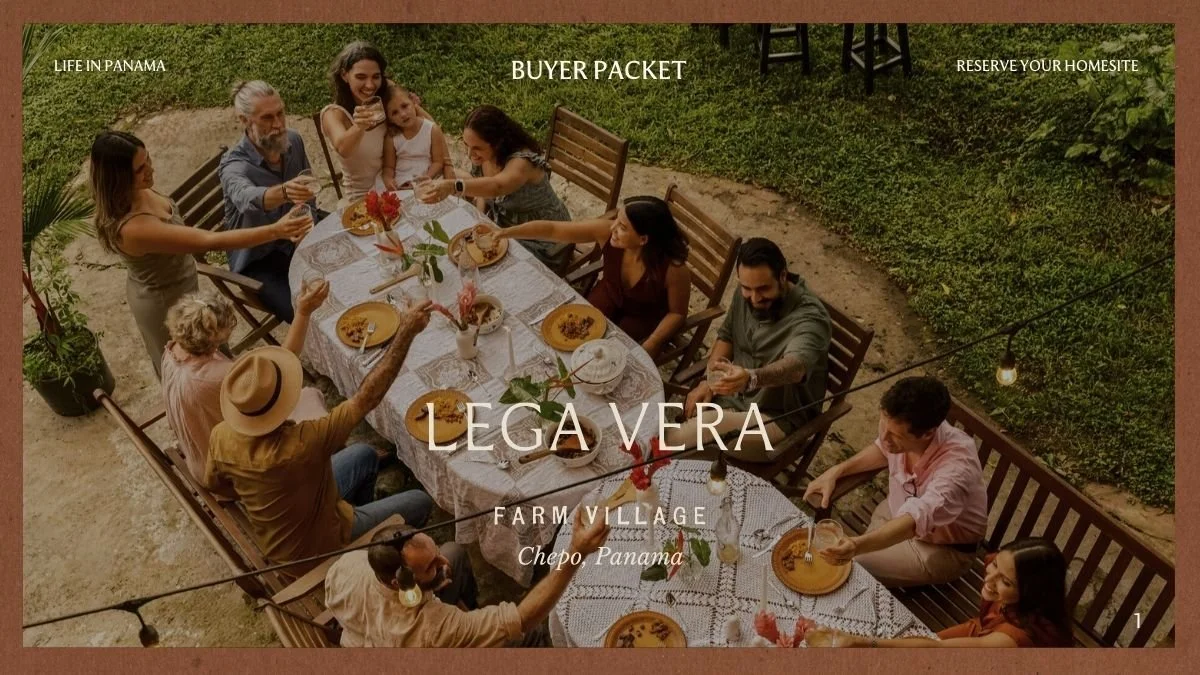FAQ
BUYING REAL ESTATE
-
Yes, you can. Panama’s constitution guarantees private property rights for foreigners almost on par with its citizens. Foreigners can directly own residential, commercial, agricultural lands, and even undeveloped plots.
-
Yes. Panama offers several residency options for foreigners, and one of the most straightforward paths is through real estate investment. By purchasing property valued at $200,000 or more, you can qualify for permanent residency. This status also opens the door to apply for Panamanian citizenship after 3 to 5 years of residency.
-
The first step is to fill out a short application. If it feels like a good fit, we’ll schedule a call with our Property Hosts to learn more about you and answer any questions.
From there, we encourage a site visit so you can experience the land firsthand and choose the homesite that speaks to you the most.
Once you’ve selected your lot, you’ll place a fully refundable deposit to reserve it. When final entitlements are secured (anticipated by Summer 2026), you’ll complete the purchase by paying the remaining balance and closing on the property.
-
At this stage, we’re offering homesites for sale—individual parcels of land where you can build your future home.
-
Yes—foreigners can qualify for financing through Panamanian banks, though requirements are typically more stringent than for citizens. Most banks offer mortgages with a 30–50% down payment, terms up to 25 years, and interest rates ranging from 6–9%. Applicants must show proof of income, provide documentation, and often carry both life and property insurance.
BUILDING IN THE COMMUNITY
-
Construction costs in Panama vary based on location, materials, and level of finish. On average, a high-end or custom-built home can cost between $800–2,200 /m² (≈ $75–205 /ft²).
These estimates typically do not include land, permits, architectural fees, or furnishings. Your final cost will depend on the design, location, and materials selected.
-
To ensure quality, harmony, and a shared sense of place, all homes must follow our architectural guidelines. These provide a creative framework that supports thoughtful design while maintaining the overall vision of the community.
-
Absolutely. In fact, we encourage it. Many residents begin with a smaller structure—like a gatehouse or guest cottage—which can later serve as housing for caretakers, visiting family, or guests once the main home is complete.
-
Yes—you're not alone in the process. We offer a selection of thoughtfully pre-designed homes that meet our community guidelines, and we can connect you with our trusted network of architects, landscape designers, and contractors to help bring your vision to life.
-
The village will grow organically alongside the community. While it's challenging to develop commercial spaces before residents arrive, we’re building at the pace of demand. The first features to be developed include a café, farm store/co-op, equestrian center, and recreational areas. As the village continues to evolve, we’ll introduce retirement homes, a community center, and a boutique hotel.
LIFE IN THE VILLAGE
-
Not at all. While farming isn’t required, we encourage residents to create productive homesites—whether that’s a low-maintenance permaculture food forest, a kitchen garden, or a more hands-on homestead with animals and market gardens.
By co-creating a community rooted in regenerative living, we have the opportunity to cultivate a world-class village where health, flavor, and connection to the land are celebrated every day.
-
Lega Vera offers 24/7 on-site security to ensure peace of mind—whether you're living here full-time or away for extended periods. Your property and the community are continuously monitored to maintain a safe and welcoming environment.
-
Lega Vera is guided by a Homeowners Association (HOA), managed by a resident-led committee. This structure empowers community members to shape decisions, uphold shared values, and steward the village as it evolves.
-
Lega Vera is designed to welcome all ages, with amenities and activities that appeal across generations. We believe that intergenerational connection is key to building a vibrant, resilient, and meaningful community.
-
In addition to our Farm Concierge program—which supports residents with land-based needs—it’s common and affordable in Panama to hire domestic help for services like cleaning, cooking, childcare, and property care. Many residents choose to have part-time or full-time support to enhance their quality of life as it is quite affordable, unlike in more developed countries.
-
There is a local school in nearby Chepo, and Panama City—about an hour away—is home to several of the country’s top international schools. While Lega Vera doesn’t currently have an on-site school, we’re actively pursuing several options to bring an alternative education model to the village. We also welcome the formation of learning pods or community-led education initiatives as the village grows.
-
Lega Vera was designed to offer more freedom than traditional developments, without the heavy zoning restrictions found in many countries. We welcome families and friends creating shared compounds and multigenerational living arrangements. While there’s flexibility, our architectural guidelines ensure that growth remains thoughtful and in harmony with the community—so you won’t find a high-rise going up next door, and we have a limit to no more than 12 residents living onsite.
-
Absolutely. The equestrian center is available to both Lega Vera residents and non-residents. Whether you're living in the village or in Panama City, you're welcome to board your horse and take advantage of the center’s facilities.
-
Yes—there is a monthly HOA fee that covers common area maintenance, trash removal, and shared community services. We’re targeting a fee range of $350-500 per month, designed to keep the village running smoothly while remaining affordable for residents.





